Beirut
Lebanon buried more of its dead Wednesday from the huge explosion at Beirut port that disfigured the city, toppled the government and deepened a painful economic crisis.
Top foreign diplomats kept streaming into traumatised Lebanon to show solidarity over its worst peacetime disaster and push for reforms to curb the corruption blamed for causing it.
Survivors and volunteers were still sweeping rubble-strewn streets a week after a large depot of industrial chemicals blew up in an explosion so powerful it was dubbed “Beirutshima” on social media.
The official death toll from the colossal blast that evoked memories of the Hiroshima atom bomb blast rose to 171, while 6,500 were injured and 300,000 left temporarily homeless.
Beirut’s main fire station, located a stone’s throw from the devastated port, held an emotional funeral for one of the 10 comrades it lost in the conflagration.
“May God be with you, our hero,” firefighters cried as they saw off the coffin of their lost friend Jo Noun during their fourth such ceremony since the August 4 disaster.
Ten firefighters are confirmed to have died, and six more are still among the missing, including three members of the same family.
Their relatives have been waiting, in their mountain village of Qartaba, for their return. “In one piece or several, we want our sons back,” Rita Hitti told AFP. The three missing young men are her son, nephew and son-in-law.
Lebanese and foreign emergency response teams were still searching the dusty “ground zero” where the explosion pulverised buildings and left a water-logged 43-metre-deep crater where a quay and warehouses once stood.
The human error that sparked the kind of wholesale devastation usually associated with a major earthquake has sparked public rage, matched only by the speed at which officials are seen to be passing the buck.
Enquiries made by AFP, and the public comments of Lebanon’s top officials, reveal that the hazard posed by the ammonium nitrate depot had been known for some time at every echelon of the state before the deadly catastrophe.
Around 100 of the wounded were recently still listed in critical condition and it was feared the death toll could yet rise as Beirut’s hospitals, only half of which are operational, kept treating the casualties.
Among those killed was a diplomat from Germany, whose top diplomat Heiko Maas arrived in Lebanon Wednesday for a short visit of support.
In a social media message before flying out he stressed the need for “profound economic reform”, echoing calls made by French President Emmanuel Macron last week during a high-profile visit to disaster-stricken Beirut.—AFP









